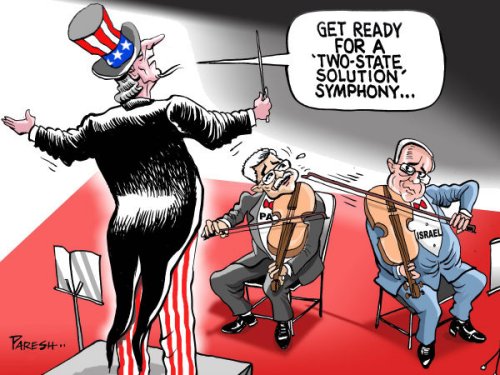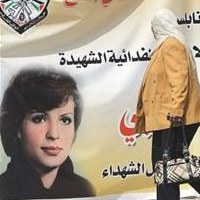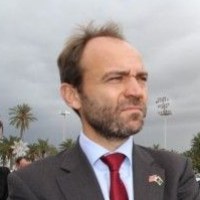The Palestinian Authority weighs the possibility of unilaterally declaring a Palestinian state.
Recently several statements have been made by senior members of Fatah and the Palestinian Authority regarding plans to unilaterally declare the establishment of a Palestinian state with the 1967 borders and East Jerusalem as its capital, and to that end to appeal to the the Security Council. Israeli Prime Minister Benjamin Netanyahu responded (at the Saban Forum in Jerusalem) by saying that there was no substitute for negotiations between Israel and the Palestinian Authority. He also said that unilateral actions taken by the Palestinians could lead to unilateral actions taken by Israel.
Recently several statements have been made by senior Fatah members, some of them close to Mahmoud Abbas, that the Palestinian Authority is weighing the possibility of unilaterally declaring the establishment of a Palestinian state and of appealing to the UN Security Council to that end:
-
Saeb Erekat, the PLO’s chief negotiator, told Al-Ayyam that the Palestinian leadership wanted to appeal to the UN Security council for international recognition of a Palestinian state with the June 1967 borders and East Jerusalem as its capital. He said that the idea had been discussed a number of times with the United States and the Europeans. He claimed that for Israel to stop its unilateral plans and building in the settlements, the world had to recognize a Palestinian state with the borders of June 1967. Were that to happen, he said, the unilateral measures taken by Israel would be considered null and void (Al-Ayyam, November 14, 2009).
-
Nabil Sha’ath, a member of the PLO’s Central Committee, told Al-Ayyam that the Palestinian Authority was getting ready to “surround” Israel in the international area and “persecute” it with legal measures through the implementation of the Goldstone Report and by bringing senior Israeli figures to trial for so-called “war crimes” against the Palestinians. He said the Palestinian Authority intended to work through UN institutions to achieve international recognition of a Palestinian state. Such a decision, he said, “will change the way Israel acts and end its claims that Palestinian land is in dispute” (Al-Ayyam, November 12, 2009).
Remarks of a different nature were made by Jibril Rajoub, a senior Fatah figure, who said that the Palestinian Authority and Fatah preferred negotiations with Israel as a “strategic option” on the road to establishing a Palestinian state. He said that “the option of a unilateral declaration of a state is not on the leadership’s agenda.” He also said that “the Israeli government does not want to advance the peace process, and if Israel forces the Palestinians into a corner, then all options will be open” (The Voice of Israel Radio, November 15, 2009).
So far, Palestinian Authority Chairman Mahmoud Abbas has not publicly elaborated on his position. However, “a senior Palestinian source” told the Italian News Agency that he had already decided to seek support in the UN Security Council for an independent Palestinian state with the borders of 1967 and East Jerusalem as its capital. According to the source, he received positive responses from Russia and UN Secretary General Ban Ki-moon. As for the unaligned countries, he will seek support during his visit to Latin America. The source also said that he had contacted a number of European countries but that more action was needed, especially with the permanent members of the Security Council (Italian News Agency, November 13, 2009).
Response of the Israeli prime minister and Palestinian reactions to his statement.
In response to Palestinian statements about the unilateral declaration of a Palestinian state, Israeli Prime Minister Benjamin Netanyahu said in a speech in Jerusalem that “there is no substitute for negotiations between Israel and the Palestinian Authority, and any unilateral attempt outside that framework will unravel the existing agreements between us, and could entail unilateral steps by Israel.” (ITIC emphasis) He called for the renewal of negotiations, saying that “We are interested in reaching a peace agreement with the Palestinians, and we are prepared to make generous concessions in exchange for a genuine peace.” At the government meeting on November 15 he said that cooperation regarding the political issue was vital, and that a genuine solution would not be achieved by taking unilateral measures (Haaretz, November 16, 2009).
The Palestinian leadership’s reactions to the speech were the following:
-
Nimr Hamad, Mahmoud Abbas’ political advisor, told the Israeli news website Ynet that the Israeli prime minister was “deep in unilateral measures.” He said that the Palestinians did not intend to declare a state unilaterally but that they wanted the Security Council to determine that the Palestinian state would be established on the lands of 1967 (Ynet, November 16, 2009).
-
Salam Fayyad, Palestinian prime minister, announced at a government meeting that the Palestinian Authority had appealed to the UN to accept responsibility for ending the so-called “occupation” in view of the continued building in the settlements. He said the Palestinian government opposed the idea of a state with temporary borders and objected to the statements made by the Israeli prime minister about taking unilateral steps (Wafa News Agency, November 16, 2009).
The United States
American State Department spokesman Ian Kelly said he had reservations about the unilateral declaration of a Palestinian state. He said “…[The United States] support[s] the creation of a Palestinian state…but think[s] the best way to achieve that is through negotiations by the two parties…[The United States] support[s] a Palestinian state that arises as the result of a process between the two parties.” (ITIC emphasis)
Source: Intelligence and Terrorism Information Center, november 17 2009
________
Mazzeltov,
Crethi Plethi



 RSS
RSS













Posted new article #crethiplethi.com about the unilateral establishment of a Palestinian State http://bit.ly/1eCK2I
Posted new article #crethiplethi.com about the unilateral establishment of a Palestinian State http://bit.ly/1eCK2I
[…] may also want to read: The Unilateral establishment of a Palestinian State. […]
[…] and East Jerusalem as its capital, and to that end to appeal to the the UN Security Council. [CrethiPlethi, nov 20, […]